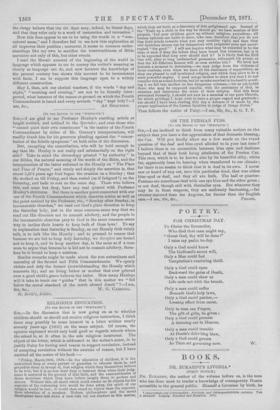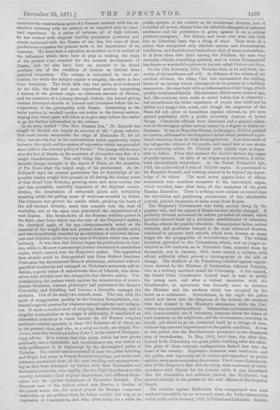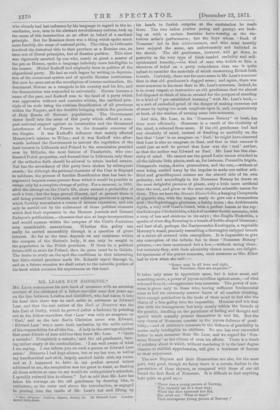BOOKS.
DR. ECKARDT'S LIVONIA.* [FIRST NOTICE.] DR. ECKARDT, the author of the volume before us, is the man who has done most to render a knowledge of cotemporary Russia accessible to the general public. Himself a Livonian by birth, he * Jungrusaisch und A ltlivlaredisch ; Poi Wachs told Culturpichichtliche Aufsatsa. Von .7. Eckardt Leipzig: Duneker uud numblol. 1571.
combines the conscientious spirit of a German intellect with the in- stinctive intimacy with his subject to be acquired only by prac- tical experience. In a series of volumes, all of high interest, he has treated with singular lucidity prominent questions and events connected with the Russia of our day, but none of these productions surpasses the present work in the importance of its contents. We have here a narrative as succinct as it is critical of the influences which have been at play in making the reign of the present Czar eventful for the internal development of Russia, and we also have here all account to be found nowhere else of the condition of Galicia ag derived from personal inspection. The volume is calculated to rivet at- tention, for while the subject-matter is weighty, the style is free from heaviness. The book falls into two parts, as is indicated by the title, the first and most important portion comprising a history of the present reign, an elaborate account of Herzen, and the narrative of a journey through Galicia; the second giving curious historical records of Livonia and Livonians before the in- corporation of the principality with Russia. Interesting as the latter portion is, we shall confine our notice to the former section, hoping that what space will allow us to give may induce the reader to go for farther information to the volume.
In an essay headed " The New Russian Era," Dr. Eckardt has sought to furnish not merely an account of the " great reforms that must render memorable the reign of Alexander II. for all time, but also the key to the contradiction which apparently exists between this spirit and the system of repression which has prevailed since 1863 in the internal policy of Russia." The change which came over the face of Russia on the accession of Alexander was that of a magic transformation. The only thing like it was the instan- taneous change wrought in the aspect of Rome on the accession
of Pio Nono after the torpid reign of his predecessor. As Dr. Eckhardt says, the present generation has no knowledge of the
peculiar leaden weight that pressed on all during the closing years of that dread Czar Nicholas, growing more and more morose, less and less accessible, morbidly impatient of the slightest contra- diction, the incarnation of autocratic gloom and irritability smarting under the galling sense of weakness revealed by defeat. The Crimean war proved the needle which, pricking the heart of the self-deemed divinity, made him crumble into the dust of mortality, and at the same time punctured the imposthume of a vast illusion. The break-down of the Russian military power in the field—that force which was the core of the Emperor's system, the cherished apple, of his eye—instantaneously acted as the removal of the weight that had pressed down on the public mind, and was immediately attended by an exhibition of universal discon- tent and criticism under the very eyes of Nicholas which was extra- ordinary. It was then that Herzen began his publications in Lon- don, while in Moscow a manuscript journal circulated in numberless copies, which entered even the Emperor's palace. The opposition then already could be distinguished into three distinct fractions. First came the discontented Moscow aristocracy, animated with oli- garchical tendencies and outraged at Nicholas's autocratic self-in- flation, a party rather of malcontents than of Liberals, who them- selves were divided into two categories that deserve notice. Not- withstanding the jealous watch against the introduction of revolu- tionary literature, German philosophy had penetrated the Moscow University, and Schelling had become a favourite amongst the students. Out of his study two schools arose. The one, with the spirit of exaggeration peculiar to the German Romanticists, con- tracted a special passion for whatever seemed national and indigen- ous. It made a studied show of adopting Russian fashions, and in singular contradiction to its origin in philosophy, it manifested an intensified orthodoxy in ritual, because the old Russian religious
sentiment resided specially in those Old Believers all of whom are in the peasant class, and who, as a religious body, are simply Non-
Jurors, men who would not follow Peter I. in his course of European- izing reform. It is curious that this party, which has now grown Politically into a formidable and revolutionary one, was looked on with indifference in its beginnings by the shortsighted police of Nicholas. The amend school consisted of men who, after Schelling and Hegel, had taken to French Socialist teachings, and under such influence contracted views all the more levelling and uncompromis- ing as they were developed by friction with their Nationalist and Slavophile comrades, who rapidly, like the High Churchmen in this country, intensified their original dispositions, and stiffened them- selves into the rigidest formalisms of Byzantine thought. The foremost man of this radical school was Herzen, a leveller of the purest water, who did indeed preach the Russian communal institution as the political form for future society, but only as an expression of Communism, and who, after ruling for a while the public opinion of his country as its intellectual dictator, lost of a sudden all power, simply from his inflexible disregard of national sentiment and his persistence in going against it on a critical political emergency. For Herzen and those who were one with him an historical basis was a thing of wind. They were of a school that recognized only absolute axioms and humanitarian conditions, and decried every basis above that of sheer materialism. It is from them that have sprung the Nihilists, the men who cynically ridicule everything spiritual, and of whom Tourguenieff has drawn so wonderful a picture in his tale called Fathers and Sons. On the 13th February, 1855, Nicholas died, as he had lived, the victim of his inordinate self-will. In defiance of the wishes of his medical advisers, the ailing Czar had encountered the chilling blasts of an intense winter atmosphere to be present at a military manoeuvre. He came back with an inflammation of the lungs, which quickly terminated fatally. His successor, thirty-seven years of age, had, like everyone, been made to cower before him in obscurity ; but nevertheless the bitter experience of events that could not be hidden had taught him much, and though the exigencies of the State did not allow of immediate organic reforms, he yet soon gained popularity with a public feverishly desirous of better things. Obnoxious officials were dismissed and a general relaxa- tion of the stringent police system ensued in a degree to create en- thusiasm. It was in May that Herzen, in his paper, Kolokol, printed in London, addressed to the Emperor a letter which produced a pro- found sensation, from its truly burning fervour. It at once made of the refugee the tribune of the people, and raised him at one stroke to an authority which, Dr. Eckardt quite rightly says, is impos- sible to define. From that moment the Kolokol became the organ of public opinion. In spite of an Argus-eyed executive, it circu- lated clandestinely everywhere. At the Nishni Nowgorod fair, 1859, the police seized a bale of 100,000 copies. It penetrated to the Emperor himself, and nothing seemed to be beyond the know- ledge of its editor. The most secret pigeon-holes of official muniments were somehow accessible to the inscrutable organ, which revealed, issue after issue, all the mysteries of the great Russian Executive. There is nothing more curious on record than the circulation and perplexing omniscience of this clandestine journal, printed thousands of miles away from Russia.
The Emperor's Government was fairly carried along by the popular tide, and the aspect of Russia became wholly changed. A perfectly feverish movement for reform pervaded all classes, which specially showed itself by a wholesale establishment of voluntary Sunday-schools for popular education. Emancipated ladies, ardent students, and professors learned in the most advanced theories, combined to promote such schools, which soon became so many lodges for the propagation of revolutionary ideas. The wildest doctrines prevailed in the Universities, which, now no longer re- stricted to 300 students, as in Nicholas's time, counted them by thousands, and in January, 1862, there ensued a collision with official authority which proved a turning-point in the tide of change. The students at St. Petersburg rebelled against regula- tions decreed by the Minister of Instruction, Admiral Putjatin, who as a military martinet closed the University. A riot ensued, the Grand Duke Constantine himself tried in vain to pacify the young men, and after a violent encounter with the Gendarmerie, an agreement was formally come to between the Minister and the students which was accepted by the latter as a settlement. Nevertheless, in the night the police seized and threw into the dungeons of the fortress the students who had trusted to the Minister's assurances, while the Uni- versity was occupied by soldiery. Tremendous excitement followed this unwarrantable act of treachery, everyone threw the blame of such measures on his neighbour, and the Government, unwilling to recede, yet afraid to go on, contented itself by a change of men, without any material improvement in the public condition. It was at this period that the Revolutionists proceeded to the disastrous step of incendiarism. In May, 1862, lurid fires, day after day, burned in St. Petersburg one great public building after the other. The glare of these criminal conflagrations flashed fear into the heart of the country. Repressive measures were instituted, and the police, now vigorously set iu motion and supported by public opinion, soon made surprising discoveries. Two Counts Rostowzow, sons of the Emperor's first aide-de-camp, were convicted of corre- spondence with Herzen for his journal, while it was discovered that the clandestine and seditious journal, the Welikoruss, was printed actually iu the presses of the staff officers of the Imperial Guard.
The reaction against Radicalism thus inaugurated was soon rendered irresistible by an untoward event, the futile insurrection which broke out in January, 1863, in Poland and Lithuania. Herzen, who already had lost influence by his language in regard to the in- cendiaries, now, true to his abstract revolutionary notions, took up the cause of this insurrection as an effort in behalf of a cardinal principle. But for Russians there was a thing which spoke much more forcibly, the sense of national pride. The rising in Lithuania involved the historical title to that province as a Russian one, an issue not of liberal principles, but of Russian position. This view was vigorously asserted by one who, nearly as great a master of the pen as Herzen, spoke a language infinitely more intelligible to the masses. Michel Katkoff had originally been in politics of the oligarchical party. He had as such begun by writing in deprecia- tion of the communal system and of specific Russian institutions. But now he came out as the mouthpiece of intense nationalism. He denounced Herzen as a renegade to his country and his kin, and the denunciation was responded to universally. Herzen became a name of the past, and Katkoff rose to the head of a party which was aggressive without and coercive within, the cardinal prin- ciple of its code being the ruthless Russification of all provinces within the Empire, and the forcible bringing within the precincts of Holy Russia all Slavonic populations. The Government threw itself into the arms of this party which offered a com- pact national support against an insurrection and the threatened interference of foreign Powers in the domestic concerns of the Empire. It was Katkoff's influence that mainly effected Murawjew's mission to Wilna ; and it was Katkoff who after- wards induced the Government to entrust the regulation of the land tenures in Lithuania and Poland to the commission presided over by Miljutin, the most furious of Panslavists, who con- fiscated Polish properties, and decreed that in Lithuania ouly those of the orthodox faith should be allowed to retain landed estates. Nor has the ascendancy of this party been shaken by subsequent events ; for although the personal character of the Czar is disposed to mildness, the process of forcible Russification that has been in- augurated imposes consequences from which it would be possible to escape only by a complete change of policy. For a moment, in 1866, after the attempt on the Czar's life, there seemed a probability of such a turn ; but the hope proved illusory, and at present there is still being pursued in Lithuania and adjoining provinces a system which forcibly necessitates a course of intense repression, and can only be carried out by the enlistment of those political elements which find their expression in the Moscow journals and General Fadejew's publications,— elements that aim at large incorporations and would squeeze within the compass of the Czar's dominions very considerable annexations. Whether this policy can really be carried successfully through is a question of grave interest. So far as the issue depends on any resistance within the compass of the Slavonic body, it can only be sought iu the population in the Polish provinces. If there be a political future still in store for Poland, then its germ must be in Galicia. The desire to study on the spot the conditions in that interesting but little-visited province made Dr. Eckardt travel through it, and on a future occasion we shall revert to the valuable portion of his book which contains his experiences on this head.












































 Previous page
Previous page